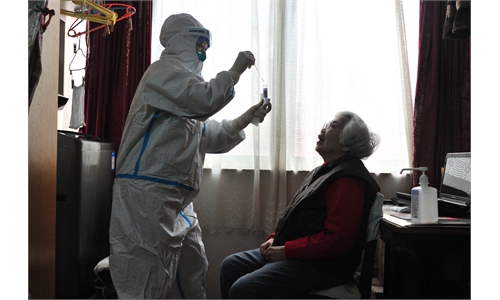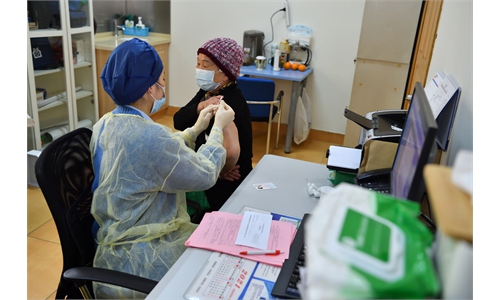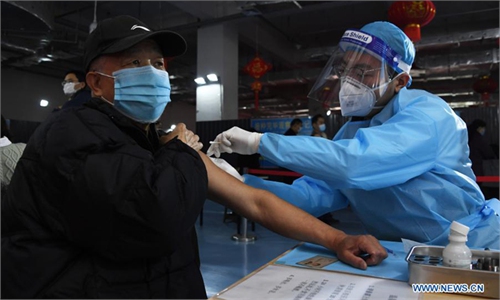Fatality rate of vulnerable population an important indicator of whether COVID-19 is over: epidemiologist Zhang Wenhong

An elderly woman receives COVID-19 vaccine booster in Shanghai. Photo: VCG
Amid domestic sporadic flare-ups of COVID-19 and discussions on how to get rid of the epidemic and return to normal life, a renowned Chinese infectious disease specialist stressed that the fatality rate of vulnerable people is always an important indicator of whether the COVID-19 epidemic is over.
Zhang Wenhong, head of the infectious disease department at Huashan Hospital in Shanghai, also director of the National Center for Infectious Diseases, made the remarks during the ongoing Boao Forum For Asia annual conference held from April 20 to 22 at Boao, South China’s Hainan Province. He noted that the vaccination rate needs to be raised among this group of people and their case fatality rate can only be maintained at very low levels if they are offered adequate medical resources and the best treatment.
“There might be many indicators for us to decide whether we have got rid of the epidemic in the future, but the case fatality rates (CFR) of the vulnerable population, the elderly and those who have underlying conditions, will always serve as a very important indicator,” Zhang said.
According to Zhang, the CFR is also an important indicator for countries to assess whether they can recover from the epidemic and whether they have sufficient medical resources. “The CFR differs greatly in different regions even if they have similar medical resources, such as Hong Kong, Singapore and Shanghai,” Zhang said.
In the latest wave of the Omicron outbreak, many countries have found that if there are sufficient medical resources to reach the most vulnerable groups in an outbreak, such as the elderly and those with serious underlying conditions, chances of survival of those at risk of infections can be maximized, Zhang noted.
Zhang suggests that countries advocate for increased vaccination rates among vulnerable groups, since CFR have been found to drop dramatically in countries and regions with very high vaccination rates among vulnerable groups.
In terms of the outbreak in Shanghai, the city where Zhang lives, he revealed that the number of infections has surpassed 430,000 with 25 deaths so far. Among the 25 deaths, 90 percent were elderly patients aged 75 or above and almost all of them had underlying diseases. Meanwhile, almost none of the severe cases in Shanghai were vaccinated.
Thus, Zhang suggested improving the efficiency of inoculation and the accessibility of vaccines, including offering vaccination services door to door and promoting the uptake of vaccines.
“China had great control over the epidemic, so people felt less risks and hesitated about vaccination. However, I believe we should further increase our trust in vaccination, and improve the accessibility and convenience of vaccination,” Zhang said.
The expert also noted that every country should come out of the epidemic and resume communications, and only with higher vaccination rates and a secured supply of medical resources can they feel at ease.



